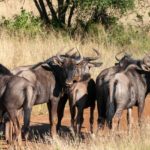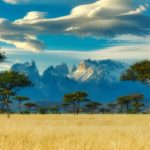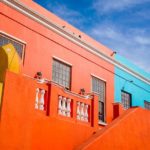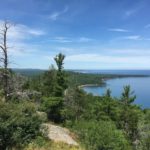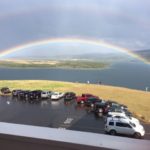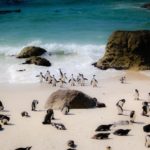A South African Safari Without Borders
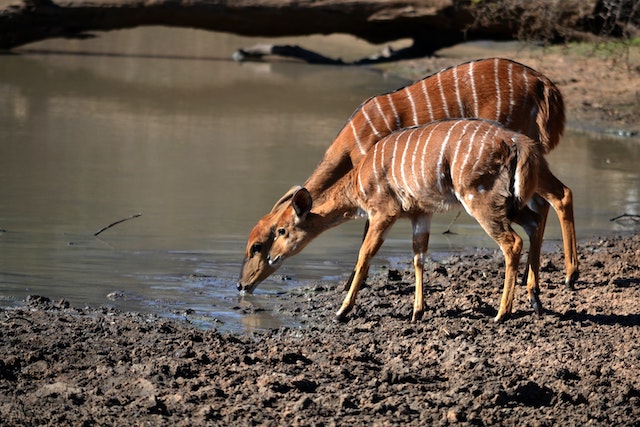
This past weekend marked the most amazing experience of my service-learning program in South Africa. This program, which is called Ubuntu, and is run through Fordham University, translates to “I am because we are”. As part of the program I am taking courses on poverty and community development and have been working in an Early Childhood Development Center in the rural community of Erasmus. I am also getting exposed to two sides of South Africa: the modern, developed South Africa, and the rural, impoverished South African Safari.
My most recent adventure was going on a South African safari in Kruger National Park to learn more about South Africa’s natural, wild habitat. Through Footprints Through Africa, we explored Umlani, a private nature reserve, which does not create a manmade barrier with nature. There are absolutely no fences in Umlani that separate it from the surrounding bush or the roaming wild animals. The lack of electricity at this lodge provides the most authentic and natural safari experience possible.
I, the girl with an irrational fear of wild animals, happened to be one of the “lucky” ones sitting closest to the lion when it began approaching.
In order to avoid the hot African sun, the game drives on this reserve take place in the mornings and early evenings. On the front of the jeep sits an armed tracker, who is highly skilled at following the subtle footprints of different animals. My very first game drive was undoubtedly my most memorable because I was lucky enough to see four of the “Big Five” in just a couple of hours. This included the sighting of two rhinos despite the fact that this animal is on the verge of extinction.
To put it into perspective, there are six billion people in the world and only about one thousand rhinos left. This experience is something that I will be telling my children about in ten years when rhinos are completely extinct.
The scariest, but also most exhilarating moment of that first drive was coming across a hunting lion. Back home in my suburban sanctuary of a neighborhood, I am too scared to walk my dog at night for fear of wild animals. But, the jeep I was sitting in had no doors, no windows, and nothing to shield me from this hungry beast. I, the girl with an irrational fear of wild animals, happened to be one of the “lucky” ones sitting closest to the lion when it began approaching. I was writhing in my seat, wanting desperately to jump to the other side of the vehicle, but dared not spook the lion.
One of the most important rules of a safari is to never stand up because that would mean changing the silhouette of the jeep to which the animals have become comfortable with. When that lion was literally two feet away from me and I could see every hair on his tawny mane, I had an epiphany about my fear of wild animals: if this hungry king of the jungle doesn’t want to hurt me, then my fear must certainly be irrational after all.
After teaching us about the medicinal properties of elephant dung, one of the rangers encouraged my group to try some.
My last night on safari was a night of many firsts for me. After teaching us about the medicinal properties of elephant dung, one of the rangers encouraged my group to try some. In his culture, some people actually smoke it to cure certain ailments like asthma. Needless to say, I was horrified. But for the sake of cultural experiences, I tried it. There are really no words to describe how uncomfortable I was with this, but I remained quiet as to respect a culture that is merely different from mine.
My second “first” that night was camping out in a secluded tree fort in the middle of the African bush. The fort is situated right above a large watering hole, so we waited patiently all night for animals to come and drink from it. Finally we heard the water sloshing. We pointed our flight lights out of the fort and sure enough there was a herd of probably fifteen or so elephants taking a midnight drink of water. We watched them intently until they very leisurely disappeared into the brush again.
Join Pink Pangea’s Travel Writing, Hiking and Yoga retreats!
The beauty of Kruger was spectacular and taught me the importance of true conservation. Kruger has been almost completely untouched by humans, which is why it, along with all of its natural inhabitants, are able to live in harmony. The fact that the animals do not fear humans here is also very telling. In many settings, especially hunting, we are accustomed to an animal spotting a human and immediately running away. It was not like this at all in Kruger, as the animals were completely at peace with us. This is the natural interaction between humans and animals.
A South African Safari Without Borders photo credits by Unsplash.

